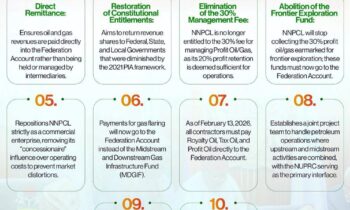 …As OPEC jacks up members’ quota by 0.4%
…As OPEC jacks up members’ quota by 0.4%
…Goldman warns of volatile oil prices amid OPEC+, US standoff
Olusola Bello
The Organisation of Petroleum Exporting Countries (OPEC+) has bowed to pressure from world leaders to increase its production output so as to bring down the price of crude oil.
To this end, the cartel at its meeting on Thursday agreed to adjust upward the monthly overall production by 0.4 mb/d for the month of December 2021.
The 22nd OPEC and non-OPEC Ministerial Meeting where they took the latest decision on production output was held via videoconference. The meeting agreed to adjust upward by additional 400,000 bpd with Nigeria’s production now 1.666mbpd against 1.649m bpd in November.
The adjustment is a reaffirmation of the 10th OPEC and non-OPEC ministerial meeting decision on 12 April, 2020 and further endorsed in subsequent meetings including the 19th OPEC and non-OPEC Ministerial Meeting on the 18 July 2021.
Other members’ quota for December are Algeria 962, Angola 1.392m, Congo 296, Eq.Guinea 116, Gabon 170, Iraq 4.237m, Kuwait 2.558m, Nigeria1.666m, Saudi Arabia 10.018m and UAE 2.885m
The meeting reiterates the critical importance of adhering to full conformity and to the compensation mechanism, taking advantage of the extension of the compensation period until the end of December 2021.
The world’s largest oil producer, the US, led calls for OPEC+ to pump more oil in a bid to tackle high domestic gasoline prices, which have become a major political battlefield. The world’s largest oil producer, the US, led calls for OPEC+ to pump more oil in a bid to tackle high domestic gasoline prices, which have become a major political battlefield.
Senior OPEC+ figures have, however, opted for a more cautious approach, preferring a strategy of increasing production as demand recovers following the Covid-19 pandemic
“The meeting resolved to reconfirm the production adjustment plan and the monthly production adjustment mechanism… to adjust upward the monthly overall production by 0.4 mb/d for the month of December 2021,” OPEC+ said in a statement
The 23rd OPEC and non-OPEC Ministerial Meeting has been fixed for 2nd of December 2021.
Oil prices however rose more than $2 on Thursday, lifted by expectations that OPEC and its allies will stick to slow output increases despite calls from the United States and large importers for additional supply to cool the market.
Brent crude was up $2.15, or 2.6%, at $84.14 a barrel by 1338 GMT and U.S. West Texas Intermediate crude rose $2.07, or 2.6%, to $82.93.
Meanwhile, Goldman Sachs warned Thursday that global oil markets could be in for a volatile period amid a standoff between the world’s biggest consumer of oil – the US – and the main group of producers responsible for more than a third of output.
Issuing a note to clients following the OPEC+ decision to keep to crude oil planned increases through 2021, the US bank said the threat of a US release from its strategic petroleum reserve would only be of modest and temporary help to oil prices that are in an upward trend.
“The now open disagreement between OPEC and the US administration, the threat of an SPR release and the potential resumption in negotiations with Iran will nonetheless increase the volatility in oil prices in coming weeks, especially as trading liquidity falls into year-end,” the bank said.
In a statement following the OPEC+ press conference, a White House spokesperson said that “OPEC+ seems unwilling to use its power to help the global economic recovery” and that the President would consider his options to improve “energy market resilience”.
The US was said to be seeking a 600,000-bpd increase from the producer group, or at the very least a guarantee that if West African members fell behind in scaling up production, then those in the Middle East could guarantee the hike.
However, both were rejected by OPEC+, which maintained the 400,000-bpd per month increase for the rest of the year.
The US has confirmed it would restart negotiations with Iran later this month, a move that could boost Iranian crude supply next year.
Goldman Sachs said in the note that any release from the US reserve could backfire next year due to a structural deficit and said it remained bullish on prices, with its current estimate for Q4 at $90/b.
Global oil demand was estimated by BP to be 100 million bpd and most analysts expect demand to exceed pre-pandemic levels of 101 million bpd in the next few months.
The rise comes as global stocks are below pre-pandemic levels, with US inventories around 4% below pre-Covid levels.





